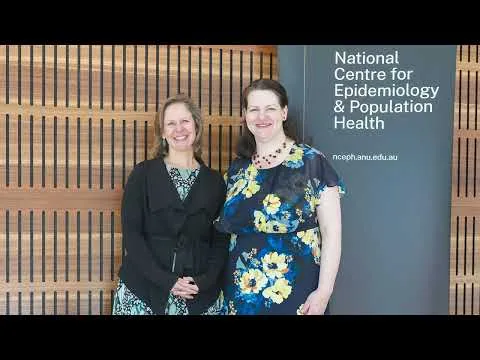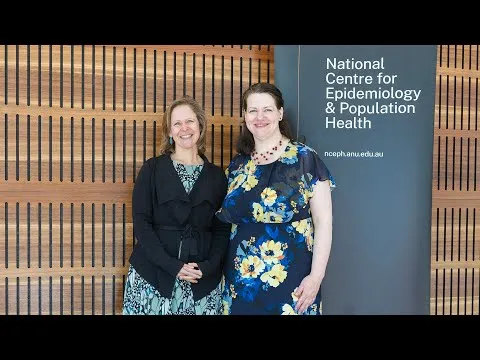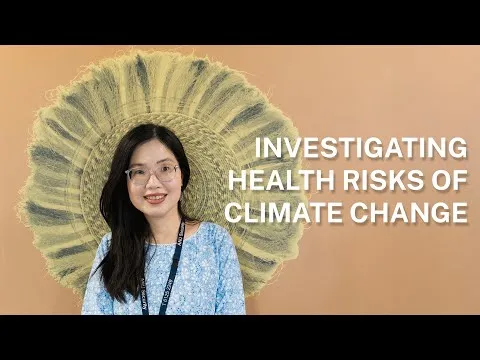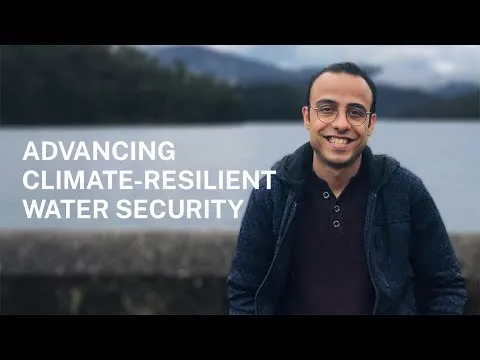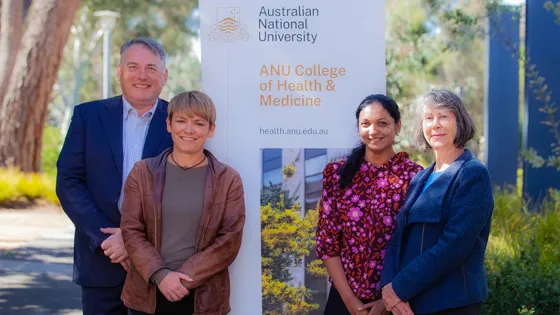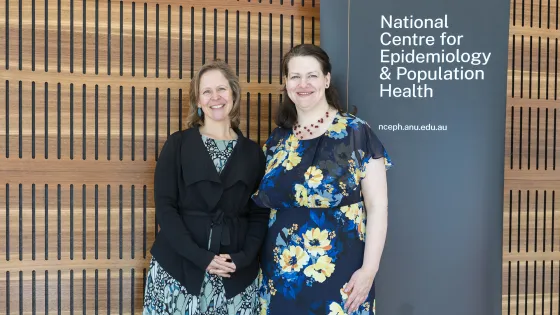McMichael Award
The McMichael Award and Fellowship Program will create and foster a global network of future leaders for a flourishing world.
About
The impacts of climate change are escalating.
As the world experiences more extreme weather events and increasing disparity, there is a need for global leadership to protect the health of the environment and of global populations.
The McMichael Award and Fellowship Program will create and foster a global network of future leaders for a flourishing world.
The McMichael cohort will:
- Develop and participate in research projects that will establish scientific foundations for community programs and policy change.
- Engage with community programs to identify, assess, and alleviate complex consequences tied to climate change.
- Initiate programs and research projects that will continue to develop past the year of the award, contributing to the growing network and influence of McMichael Award recipients.
Award benefits
The McMichael Award supports research and career development through a global network of mentors and through leaders connected to NCEPH through the late Emeritus Professor McMichael’s legacy. Up to $30,000 will be offered to the successful applicant to contribute to their agreed-upon research over 12 months.
Who can apply
As the urgency to address the impact of climate so is the need to develop the next generation of leaders.
Our early and mid-career researchers (3-9 years FTE from PhD completion) have the exciting opportunity to carve out new fields of research and find solutions to the challenges we all face because of climate change.
The Award is currently available to any domestic salaried researchers at ANU who are engaged in diverse and interdisciplinary fields of study, including but not limited to population health, planetary health, climate change and its impacts on population health, equity and health, as well as other related disciplines such as philosophy, music, arts, law, gender studies, engineering, business, medicine, environmental science, social science, public policy, and sustainability science.
Applications open on Monday 21 July 2025 and close on Sunday 14 September 2025 11:00pm AEST. Please submit applications to McMichaelAward.NCEPH@anu.edu.au AND Aparna.Lal@anu.edu.au
Award Endowment
Funding for the Award is by a generous donation from Associate Professor Judith Healy, with a gift match from the National Centre for Epidemiology and Population Health to endow the Tony McMichael Award. The McMichael Award is named in honour of Judith’s late husband, Emeritus Professor Tony McMichael AO.
We are seeking funding partners to help build the McMichael endowment to create an international award and fellowship program for the next generation of public health leaders, to protect the health of people and the environment.
All gifts are important for helping us achieve our goal, with gifts of 5 and 6 figures, and up, making a significant impact.
Frequently Asked Questions
What is the McMichael Award?
The McMichael Award supports outstanding early and mid-career researchers eager to find solutions to the challenges our globe faces due to climate change.
The program is designed to foster leadership, build interdisplinarity, and offer opportunities to gain experience and access to the growing network and influence of the McMichael Award recipients.
How many awards will be delivered each year?
There will be 1 scholarship awarded each year.
What is the value of each award?
The McMichael Award will provide funding of up to $30,000 for 12 months to support research projects.
Who will remit the funds to the awardees?
The scholarship funding will be distributed by the university to the scholars. Funds are to be made accessible to the successful applicant upon receipt of the signed Award Acceptance page, acknowledging the acceptance of all Conditions of Award contained herein. Awarded funds must be exhausted within 12 months from the date of inception meeting unless prior approval is given by the Director of the Awards Program. Any unspent funds must be returned to the endowment.
Eligibility criteria: What academic qualifications do I need to apply?
Yes, you must be a domestic researcher (a domestic researcher is considered an Australian citizen, New Zealand citizen, holder of an Australian Permanent Resident visa or a permanent humanitarian visa) and an early to mid-career researcher within the first three to nine years (full-time equivalent) of academic or other research-related employment which followed completion of postgraduate research training.
Further to this, you must be a salaried ANU researcher (continuing or with at least 12 months remaining on their contracted position at receipt of the award) and not be on a period of extended leave without pay.
At the time of award, you must not hold a Category 1 Fellowship or equivalent (e.g. Westpac /Bupa/Heart Foundation fellowships)
What fields of study are applicable for the award?
The Award is currently available to any domestic salaried researchers at ANU who are engaged in diverse and interdisciplinary fields of study.
These fields of study include but not limited to population health, planetary health, climate change and its impacts on population health, equity and health, as well as other related disciplines such as philosophy, music, arts, law, gender studies, engineering, business, medicine, environmental science, social science, public policy, and sustainability science.
This is a non-exhaustive list of disciplines and we encourage applicants from all faculties and research groups across the ANU where the research focus explores human-environment interactions with a lens on climate change and it’s negative impact.
What can I use the funds for? What sort of projects are suitable?
The McMichael Award is intended to support research that advances understanding and action at the intersection of human and environmental health. Funding can be used for a diverse range of activities that contribute to this goal, including empirical research, methodological innovation, community engagement, policy translation, and capacity building. Projects might examine the health impacts of climate change, develop tools or frameworks for more sustainable and equitable systems, or foster interdisciplinary collaboration across public health, environmental science, social sciences, and policy.
Support may also be directed toward fieldwork, data collection, employment of research staff, and analysis using novel or contextually grounded approaches. Prospective applicants are encouraged to consider how their work might be communicated beyond academia, through partnerships, public engagement, or contributions to policy and practice. Ultimately, the Award aims to catalyse research that not only deepens knowledge but also contributes to the protection and enhancement of both planetary and human health, with lasting benefit for Australia and the region.
By funding projects that span these diverse areas, the McMichael Award aims to foster interdisciplinary approaches to addressing the urgent challenges posed by climate change, ultimately contributing to the protection and enhancement of both human and environmental health.
How do I determine my funding request?
You are required to prepare a draft budget of up to $30,000 as part of your application. If your application is successful, the McMichael Award team will work with you to finalise your scholarship.
The budget should include all costs associated to your anticipated program of research activities (including but not limited to, conference and short course fees; equipment and consumables; travel; and publication and dissemination costs).
Please note that your application is not assessed on the amount of your request, but rather the thought and consideration behind your plans.
When can I apply?
Applications open on Monday 21 July 2025, and close on Sunday 14 September 2025.
How do I apply?
Please use this application form - also linked at the top of this page, submit via email to mcmichaelaward.nceph@anu.edu.au AND aparna.lal@anu.edu.au
PLEASE NOTE: If you have not received an acknowledgement of your application within 48 Business hours, Please Email Associate Professor Aparna Lal to confirm that we have received it.
Can you provide an overview of the selection process?
Selection will be based on a demonstrated track record in research and impact that focuses on environment-human interactions. Applicants must demonstrate:
- how their intended research during their duration as a McMichael Awardee will contribute to protecting the environment and human health and build Australia’s capacity in this interdisciplinary area;
- their research methodology and intended outputs;
- why they are well suited to undertake research in this area and detail how this award will provide a platform for their independent research career; and
- their plans for dissemination and communication of research results to the wider community, and via professional networks and social media.
The award will be offered to the awardee/s by a Selection Committee chaired by the Director of McMichael Award and Fellowship Program and include:
- Director, NCEPH or nominee
- Director of the Menzies Centre for Health Governance, RegNet, or nominee
- Member of the Australian National Centre for the Public Awareness of Science
- Member of Fenner School of Environment and Society
- An additional panel member may be nominated by the Committee as required
To ensure a fair and unbiased selection process for the McMichael Award, the following guidelines will be strictly adhered to:
Avoidance of Preferential Selection:
- The selection panel must operate under a framework that prevents any single member from unduly influencing the decision in favour of a particular applicant. All decisions should be made collectively, based on the established criteria and the merit of each application.
Conflict of Interest:
- Any member of the selection panel who has a direct supervisory relationship, close professional association, personal relationship or have participated in funding the individuals research in the past must declare this conflict of interest immediately.
- Such members must recuse themselves from evaluating or discussing the applications of the individuals with whom they have a conflict of interest.
- If a significant number of conflicts arise within the panel, alternative unbiased members will be appointed to maintain the integrity of the selection process.
Blinding Procedures:
- To further prevent selection bias, a double-blind review process will be implemented where feasible. In this process, the identities of the applicants will be concealed from the reviewers, and reviewers' identities will be kept anonymous to the applicants.
Applications will be assigned identification numbers, and all personal identifiers will be removed from the documents reviewed by the selection panel.
When will applicants find out if they are successful
Applicants will be notified of whether they are successful in late September 2025.
I need more help with my application, who can I contact?
Please forward any questions you may have to mcmichaelaward.nceph@anu.edu.au OR aparna.lal@anu.edu.au
Awardees
2022
Dr Zoe Leviston (School of Medicine and Psychology)
2023
A/Prof Amy Dawel (School of Medicine and Psychology)
Dr Annabel Dulhunty (Crawford School of Public Policy)
2024
Dr Yen Le (School of Culture, History and Language)
2025
Dr Milad Mohsenzadeh (School of Engineering)


